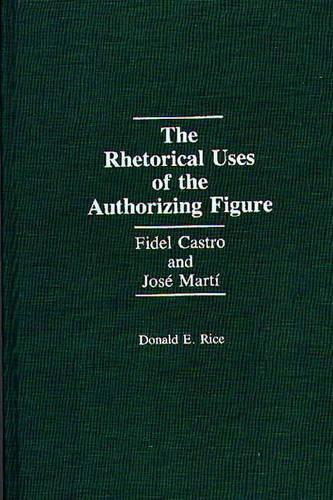
The Rhetorical Uses of the Authorizing Figure: Fidel Castro and Jose Marti
(Hardback)
Publishing Details
The Rhetorical Uses of the Authorizing Figure: Fidel Castro and Jose Marti
By (Author) Donald Rice
Bloomsbury Publishing PLC
Praeger Publishers Inc
16th June 1992
United States
Classifications
Tertiary Education
Non Fiction
Revolutionary groups and movements
Revolutions, uprisings, rebellions
History of the Americas
302.2
Physical Properties
Hardback
192
Description
One of the tools often used by a rhetor to motivate, solidify, and manage his constituency is the "authorizing figure". While the referencing to historical figures is a common practice and frequently employed in the political realm, it takes on a special role in the inception, activation, and maintenance of social movements. This study analyzes the rhetorical uses of the authorizing figure during the Cuban revolution and Fidel Castro's use of Jose Marti, the civilian leader of the 1890s independence wars from Spain. Donald Rice discusses how the authorizing figure defines and unifies the emerging revolutionary movement, contributes to the application of the sanctioning authority of the state, and legitimizes the revolutionary vision over time. These three "uses" provide the framework for the detailed analysis of Castro's discourse over the course of the revolution and its institutionalization, both representing and describing Castro's rhetorical strategy of using the past for present purposes. Chapter 1 is a discussion of the theoretical concepts of authority and authorization, which includes an explanation of the three-tiered approach used in the analysis. Chapter 2 gives a short history of Marti and a review of relevant Marti studies. Chapters 3, 4, and 5 contain the analyses of discourses relevant to Rice's established "uses". Chapter 6, the concluding chapter, provides a synthesis of the preceding analyses and suggests areas of future research. These three "uses" provide the framework for the detailed analysis of Castro's discourse over the course of the revolution and its institutionalization, both representing and describing Castro's rhetorical strategy of using the past for present purposes.
Author Bio
DONALD E. RICE is Assistant Professor in the Department of Speech Communication at Concordia College, Moorhead, Minnesota. His teaching and research interests lie in rhetorical theory and criticism, as well as Latin American studies.
